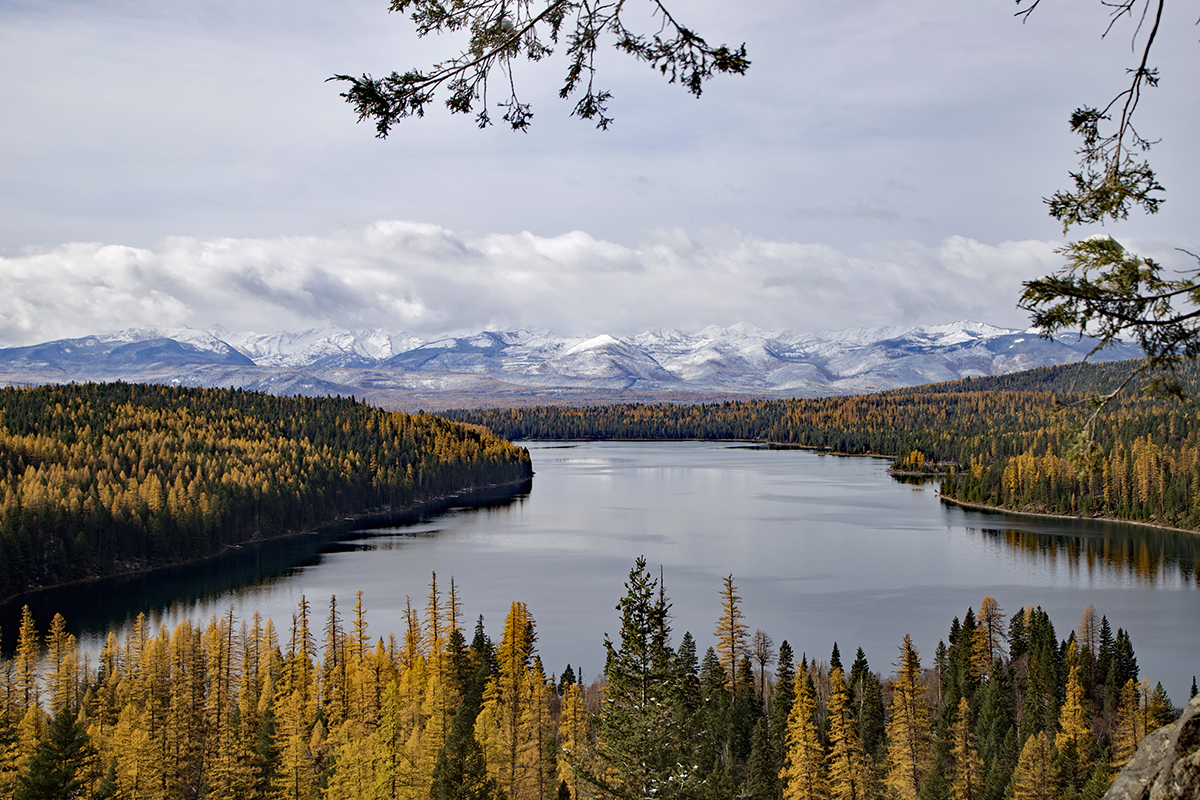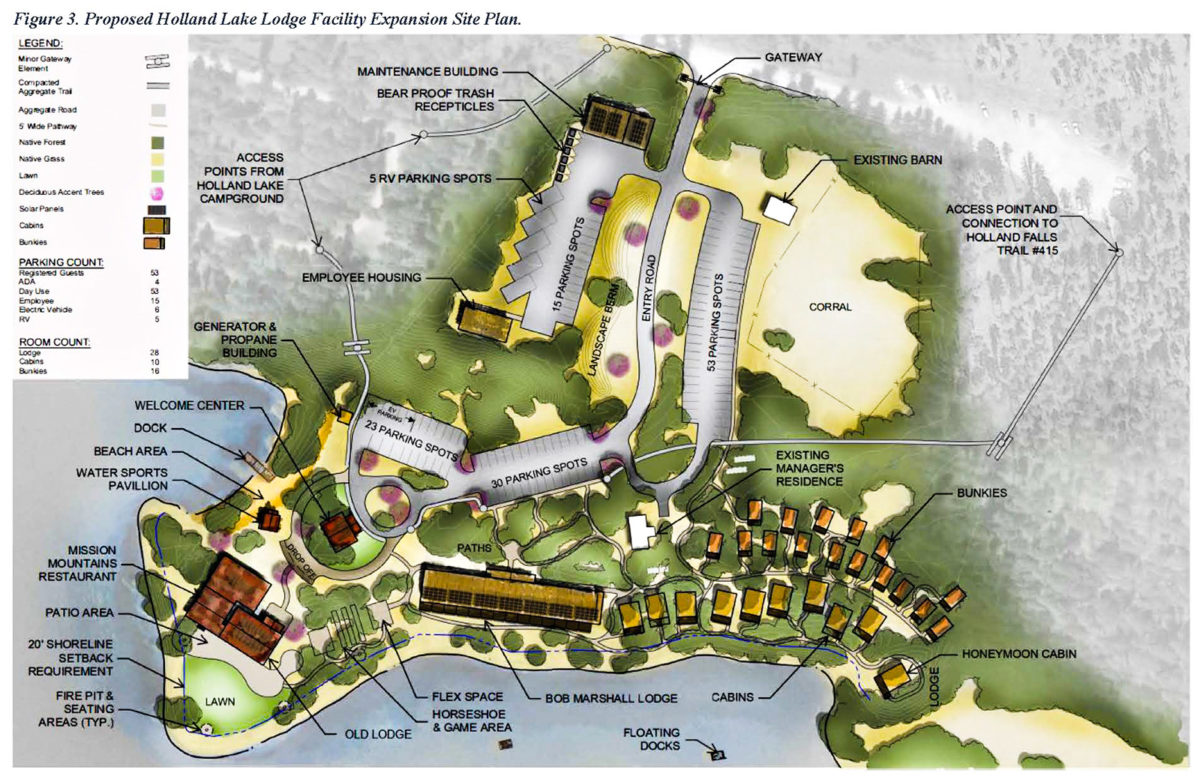As Opposition Mounts, Longtime Holland Lake Lodge Owner Defends Expansion Proposal
Under new corporate ownership, the historic lodge’s occupancy footprint would triple, prompting calls for a more stringent standard of environmental review
By Tristan Scott
In the 24 summers that Christian Wohlfeil has worked at Holland Lake Lodge — 21 of them as its owner-operator — he’s turned the sheets and greeted the guests, trimmed the hedge and cooked the eggs, shaken cocktails and scrubbed the floors.
“I was 21 years old and just out of college when I started working here in 1999,” Wohlfeil said. “I started managing the property and then I bought it in 2002. That makes me the longest-running owner since it was built in 1924. I have a deep connection to this place. But I can’t afford a management team, so guess who’s been cooking breakfast for the past 10 years?”
To ease the burden, Wohlfeil began entertaining offers from prospective business partners six years ago. He entered under contracts with two of them (but failed to close) and turned down numerous offers from others before finally settling on a buyer in January 2021, selling a portion of his shares in Holland Lake Lodge Inc. to POWDR, a Park City, Utah-based ski resort company. Wohlfeil says the company checked all the boxes for ensuring a “viable, healthy, sustainable business,” as well as maintaining a commitment to “inclusivity” — a condition that other prospective partners failed to meet.
“POWDR has been phenomenal. They understand what makes this place special and they want to keep that intact,” Wohlfeil said. “I know people look at corporations as the bogeyman, but I can’t afford to make this a sustainable business without help. One company wanted to make this a high-end exclusive resort and I chose not to work with them. But I am proud to have POWDR involved in this.”
Not surprisingly, POWDR’s involvement is contingent on making the business a commercially profitable operation, which, according to its proposal, means expanding.
Because Holland Lake Lodge operates on public land managed by the Flathead National Forest, the facility operates under special-use permit authority from the U.S. Forest Service (USFS), which permits the commercial and recreational venture on a 15-acre rustic lakeside property south of Condon, although Wohlfeil says his current footprint spans just three acres. Like a ski resort operating on public land, any improvements or upgrades to the facility must be approved by the federal agency and are subject to public scoping and environmental review. The facility was last updated in 1947 after a fire razed the original structure.
The expansion proposed by POWDR would include construction of a new 28-room, two-story, 13,000-square-foot lodge, as well as 10 lake cabins pegged at 650 square feet each. The proposal also calls for 16 smaller studio cabins at 250 square feet each; a new 2,000-square-foot welcome center; a 3,000-square-foot restaurant; a small watersport building; and new support buildings, including a 2,000-square-foot maintenance building and a 2,000-square-foot building for employee housing.

In response to the proposal, the Flathead National Forest had received more than 5,000 public comments as of Sept. 27, nearly all of them opposing the expansion. Meanwhile, a “Save Holland Lake” action group has launched a campaign to resist the project, promoting a flurry of materials through its website and social media accounts. According to Trisha Cameron, an attorney who is affiliated with the group, which she describes as a “coalition of citizens and nonprofits,” much of the concerns center on the facility’s location at the “gateway to the Bob Marshall Wilderness,” as well as the high-quality grizzly and lynx habitat ringing Holland Lake, which sits inside the Northern Continental Divide Grizzly Bear Recovery Zone.
The expansion and improvements would also enable the lodge to remain open during the winter, a proposition Wohlfeil said can’t happen without upgrades given the conditions of the current accommodations, which have scant insulation. The user-capacity footprint would expand from 11,340 user days per year at present to 46,980 user days per year, which many commenters raised as a concern.
Still, numerous comments merely oppose the proposed expansion on its face, citing the perception of an “out-of-state developer” intruding on Montana’s landscape to pursue an agenda of “corporate greed” — “STAY THE HELL OUT OF OUR BEAUTIFUL MONTANA,” reads one comment, which is typical of scores of others.
“I can’t say that I’d feel any different if I lived there,” said Stacey Hutchinson, vice president of communications at POWDR. “We keep hearing, ‘where are you going to install the chairlifts?’ And I get it. But my hope is that people can learn more about POWDR and not see us as the bogeyman. Honestly, we may be the devil they know.”
According to Hutchinson, there will be “no mega-hotel, no massive housing development, no mansions, no owner-occupied cabins, no ski hill, no chairlift, and no exclusive club houses.”
“Our goal here is to keep the wilderness values and the pristineness and the ethos intact,” she said, referring skeptics to what she described as the company’s proven track record of environmental sustainability. “Candidly, I empathize with and 1,000 percent understand why the locals are skeptical and are wondering about what is going on there. When you look at this place, you can immediately see the heart and soul and sweat that Christian has invested. That is why he has chosen to partner with us and not someone else — because we share the same vision. We see eye to eye. We want to keep this place accessible and open to regular people. We don’t want to be exclusive. We don’t want this to be a playground for the uber-wealthy. We want people to come enjoy Holland Lake, whether they’re from Montana or other parts of the world.”
According to Wohlfeil, 70% of Holland Lake Lodge’s guests are out-of-state residents who are also repeat clients drawn to the destination resort.
“At one point this summer, I had guests staying here from 11 different states and three Montana cities and I was serving them breakfast and making their drinks,” Wohlfeil said. “It’s a bit of a Catch-22 because people want to save this place for Montanans but we are also a resort. I think we can be both.”
The Flathead National Forest began soliciting public comment on Sept. 1 and set a deadline of Sept. 21. That narrow timeframe, coupled with the Forest’s determination that the project could be categorically excluded from a more rigorous standard of analysis and documentation required by an Environmental Impact Statement or Environmental Assessment, prompted immediate pushback and ultimately led Forest Supervisor Kurt Steele to extend the period to Oct. 7. Forest officials also held a public forum on Sept. 8 and scheduled another for Oct. 4 at 5:30 p.m. at the Seeley Lake Elementary School. Unlike the initial forum, the upcoming meeting will include a presentation and the opportunity to ask specialists questions. There will also be an option to join the meeting online.
“The comments so far have made it clear to me that there is a lot of confusion surrounding the process and potential use of a categorical exclusion,” Steele said. “I would like to make it clear that the use of a categorical exclusion does not mean there will not be an environmental analysis. The timeline for this project is to have a decision in late winter/spring 2023, with analysis and consultation ongoing until then. No decision has been made yet on this project or if a categorical exclusion, environmental assessment, or environmental impact statement would be used.”
According to Wohlfeil, the projected timeline wouldn’t see the new lodge open until May 2025, and he believes the public’s fervent opposition will be mitigated as residents learn more about the plans.
“If you look at the site plan, there will be interpretive signs about grizzly bear habitat, there will be educational kiosks, there’s a dark-sky initiative to limit light pollution,” Wohlfeil said. “I will argue that in the years to come, public sentiment is going to accept this. People don’t realize that this could have been a lot worse. I honestly believe this will be a real improvement.”
For more information on the proposal and to submit public comments, visit the Flathead National Forest’s project website. For more information on the Save Holland Lake group, visit its website here.